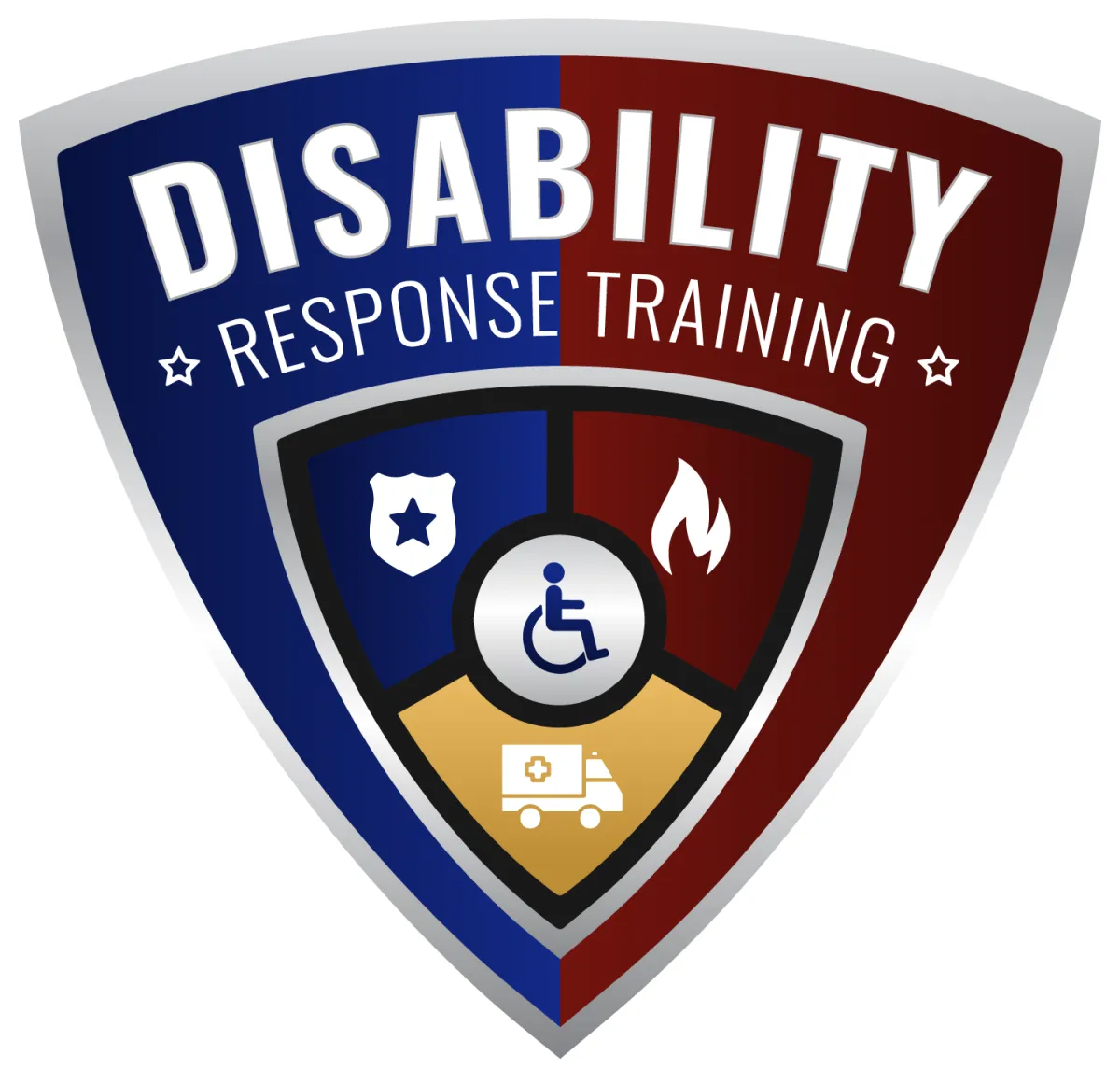Disability Response Training
Comprehensive Training Empowering Law Enforcement to
Successfully Interact with Physically Disabled Suspects.
The Missing Link in Law Enforcement Readiness
Preparing Your Department for Today's Challenges and Tomorrow's Scrutiny
Physically disabled suspects present unique challenges in law enforcement encounters, yet traditional police training often overlooks this critical area—leaving a dangerous gap that can lead to unnecessary risks, lawsuits, and public outrage.
Disability Response Training (DRT) is a groundbreaking program—completely unique in the U.S. and likely the world. This proprietary content didn’t exist until now. No other training prepares your officers with the advanced skills needed to safely and effectively interact with physically disabled suspects. It’s the only program of its kind, providing essential preparation for modern law enforcement to meet today’s challenges with confidence and professionalism.
Our trainings are designed to address real-world scenarios and focus on three high-impact areas:
Understanding physical disabilities and mobility devices
Mastering control and cuffing techniques
Executing safe lifting and searching procedures
Whether your officers are de-escalating tense situations, engaged in high-stakes arrests, or uncovering hidden contraband, DRT's training prepares them for the complexities of these interactions—delivering both actionable strategies and physical techniques your officers can trust and use immediately.
With online modules, hands-on instruction, and real-world simulations, DRT doesn’t just teach—it transforms how your team operates in the field.
This training goes beyond compliance—it protects your officers, safeguards your department’s reputation, and strengthens your connection with the community. If you want to reduce risk, enhance safety, and ensure your officers are prepared for the challenges they face today and the scrutiny they may encounter tomorrow, Disability Response Training is the answer.
Hear Kevin Harrington's Message to Police Departments Supporting Disability Response Training
Kevin Harrington, the Original Shark on NBC's Hit TV Show, Shark Tank
Explore Our Trainings
From basic protocols to advanced hands-on training, we prepare officers for real-world scenarios
Crucial Solutions Designed to Address Blind Spots in Law Enforcement Training
Empowering Law Enforcement to Safely Interact with Physically Disabled Suspects
Specialized Training to Reduce Risks and Strengthen Public Trust
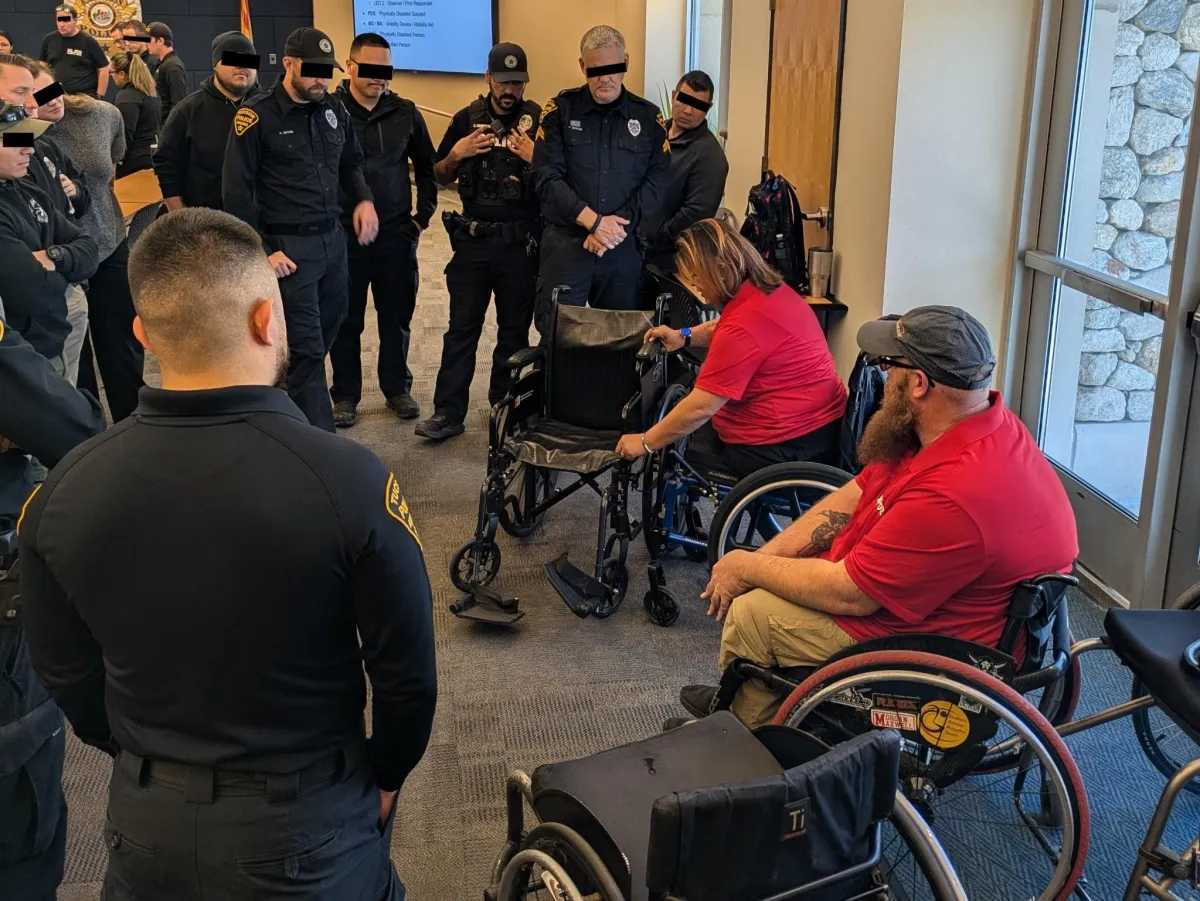
Disability and Equipment
Familiarization
Failure to recognize a disability—or characteristic of a disability—has been shown to escalate real-life situations, leading to unnecessary use of force.
Mishandling a situation can result in complaints against officers, injuries to officers and suspects alike, and lawsuits—all of which can be avoided with proper training.
Valuable insight is provided into both the mindset and physical capabilities unique to the types of disabilities and corresponding mobility devices your team engages with every day.
Officers learn to spot hidden dangers, identify hiding places, disengage mobility devices for added safety, as well as dismantle wheelchairs and scooters for easy transportation.
This knowledge fosters understanding; while the skills ensure confident, safe, and effective interactions for both officers and suspects.
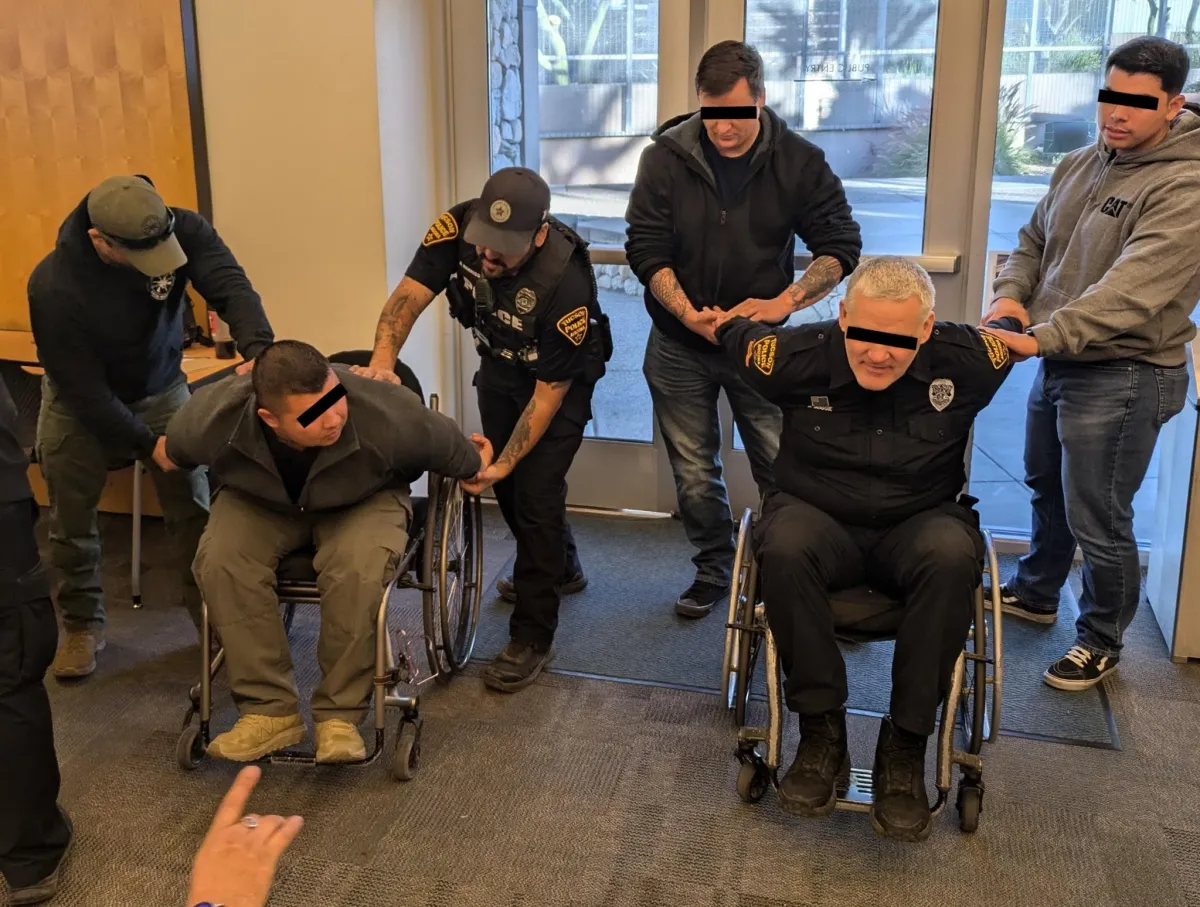
Control and Cuffing
Techniques
Escalated encounters—specifically with physically disabled suspects—increases the probability of causing injury, fatality, and public perceptions of insensitivity.
Without specialized training, officers may hesitate or make critical mistakes.
Real-life scenarios and proven, easy-to-learn techniques are used to prepare officers for safely controlling and cuffing disabled suspects.
Learn methods for dominant side control, de-escalation strategies specific to the disabled community, and master solo and partnered arrest techniques that emphasize mechanical control over pain compliance.
This critically important training reduces individual risk and departmental liability, while simultaneously keeping officers and vulnerable members of your community safe.
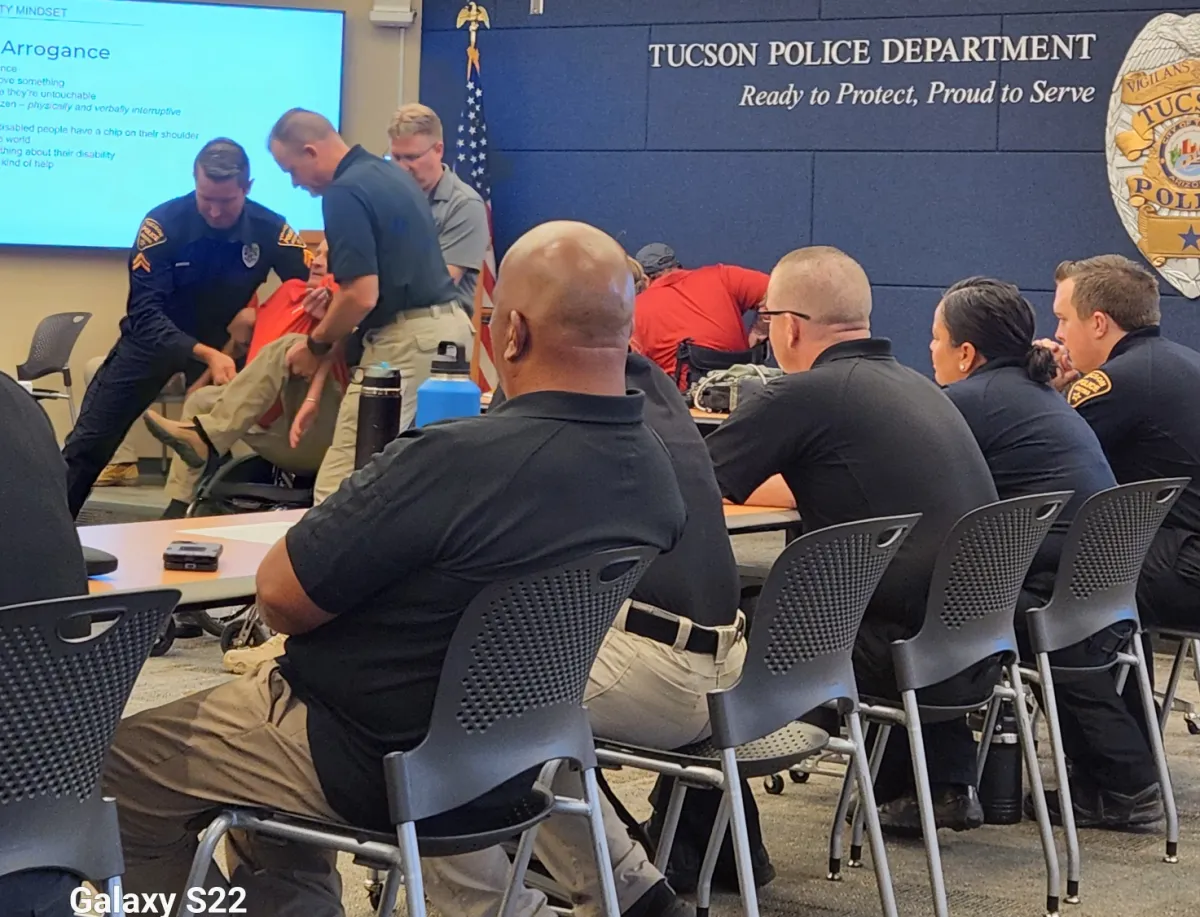
Lifting and Searching
Methods
Improper lifting techniques sets your officers and suspects up for injury, and your department up for liability.
Missed hiding places and incomplete searches compromise safety, allowing suspects to get away with illegal activity.
Learning when, why, and how to safely remove a suspect from their mobility device—and successfully transfer them to a police vehicle—is essential for thorough searches and safe arrests.
Real-life case studies reveal uncommon hiding places for contraband, officers practice advanced two-person search techniques, identify medical devices ethically, and handle prosthetics with care and sensitivity.
This essential program builds officers' comfort and confidence when going hands-on with physically disabled suspects and improves department credibility by strengthening public trust in your policies.
Why Your Officers Need This Training
Bridges a Critical Training Gap
Traditional law enforcement training rarely addresses the specific challenges of interacting with physically disabled suspects.
Response to a Growing Reality
With the increasing number of interactions between law enforcement and the disabled community, this training ensures your officers are prepared for the unique demands of modern policing.
Protects Departments From Liability
Improper handling of physically disabled suspects can lead to lawsuits, negative press, and erosion of public trust.
Choose the Right Training for Your Department
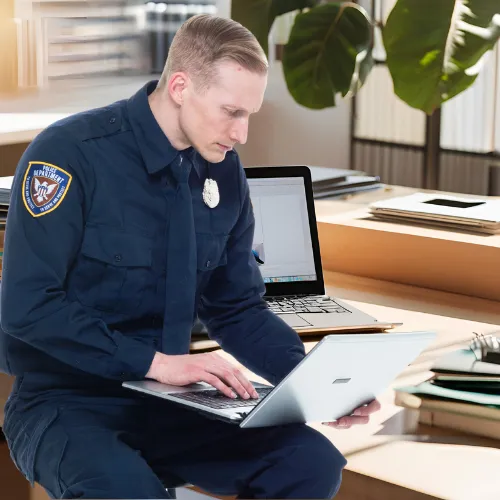
Option 1
Foundations in
Disability Response
Equip your officers with essential knowledge using unlimited, on-demand access to our comprehensive Disability Response Training video series for one year.
This online program ensures your department has the foundational tools to build awareness and confidence when safely interacting with physically disabled suspects.
Budget-friendly option for immediate department-wide impact.
Convenient, flexible training that fits any schedule.
Boosts officers' preparedness and reduces liability risks.
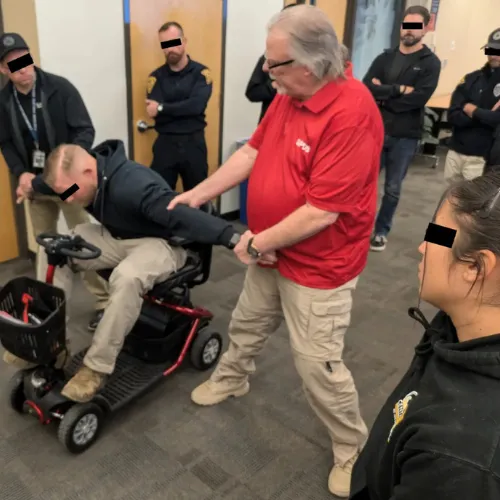
Option 2
Train-the-Trainer Advantage
Empower your department to lead the way in Disability Response Training.
This package licenses your team to deliver our proven methods directly to your officers for one year.
You receive unlimited video training access for your entire department, a 3-day immersive Train-the-Trainer program for your staff, and hands-on, in-person academy cadet training led by our experts.
Builds internal expertise, creating sustainable training capacity.
Enhances consistency across shifts and teams with in-house trainers.
Positions your department as a leader in comprehensive and effective policing.
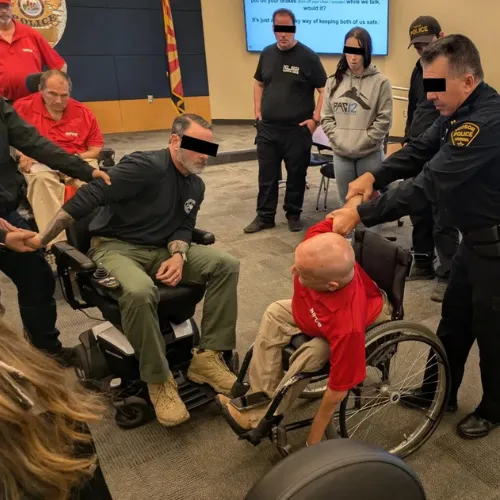
Option 3
Department Mastery in Disability Response
Experience the ultimate training solution with personalized, in-person instruction from the founder of Disability Response Training.
This hands-on program delivers department-wide mastery of the critical techniques needed to ensure your officers' safety and public trust when engaging with physically disabled suspects.
Tailored, interactive learning that addresses your department's unique challenges.
Maximizes officer confidence and effectiveness through live demonstrations and role-playing.
Sets a new standard for policing excellence, strengthening public trust and department credibility.
Ensures your officers have easy-to-use, practical techniques they can apply immediately—both by themselves and with a partner
Success Stories from Our Partners!
Capt. Lauren Pettey
16 Years on the Force
Tucson Police Department

"Very interactive and engaging! This should be incorporated in the basic training academy!"
Sgt. Jason Winsky
20 Years on the Force
Tucson Police Department

"Excellent! The hands-on component is so dynamic officers walk out with physical skills! PJ is excellent!"
Alex Queroz, Patrol
17 Years on the Force
Tucson Police Department

"Excellent training! I learned so much; now I have confidence with my next interaction. Everything was great!"
ATTENTION
According to the Department of Justice (DOJ) and the International Association of Chiefs of Police (IACP), law enforcement agencies must be prepared to interact effectively with individuals with disabilities.
And while the Americans with Disabilities Act (ADA) doesn't explicitly state that law enforcement agencies "must have training"—the DOJ and IACP both strongly recommend and advocate for training—specifically because training is recognized as a key tool to ensure compliance and reduce risk.
Most departments get some form of "mental health crisis" training, which is limited to emotional and cognitive disorders. As such, this training is incomplete because it fails to address how LEO can successfully interact with physically disabled people and suspects—like many in the homeless population. This oversight leaves law enforcement with blind spots—and leads to misunderstandings, escalated encounters, and possible compliance issues with the ADA.
Without proper training, departments risk legal liability, public distrust, and preventable harm.
Disability Response Training (DRT) is the first and only program of its kind—designed to equip officers with the skills and knowledge to bridge these gaps. This training ensures your department meets today’s challenges head-on while safeguarding your officers, your community, and your department's reputation.
DRT isn’t just another program—it’s the solution your department needs to meet the growing challenges of modern law enforcement.
Ready to Make a Positive Change?
Contact us today to learn more about our training programs and how they can benefit your department.
Empowering Law Enforcement to Successfully Interact with Physically Disabled Suspects
Essential training to prepare your officers for any situation involving a physically disabled person—boosting individual safety and reinforcing public trust.
Contact:
© 2026 Disability Response Training
All Rights Reserved - Privacy Policy
System Architecture by AI Advisor Systems
